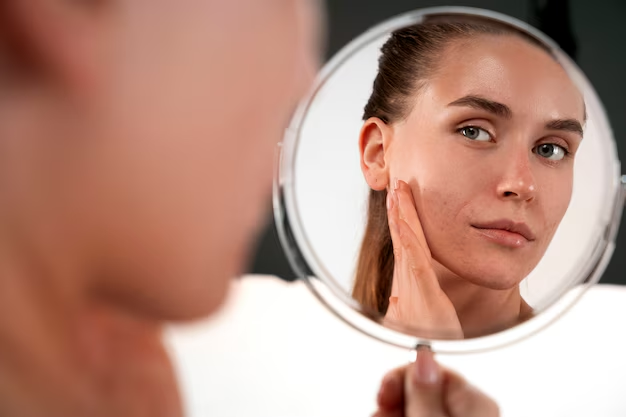Bidding Farewell to Dark Spots: Your Guide to Clear, Even Skin
Dark spots left behind by acne can be as stubborn as they are frustrating, often lingering long after the blemish itself has resolved. If you’re tired of battling these pesky reminders, you’re not alone. Luckily, there are numerous strategies to help fade dark spots and restore your skin's natural beauty without needing a prescription or professional treatment. Let’s explore some effective ways to tackle acne-related hyperpigmentation.
Understanding Acne-Related Dark Spots
What Causes Dark Spots?
When acne clears, it can leave behind dark spots known as post-inflammatory hyperpigmentation (PIH). These spots form as your skin heals, due to excess melanin production, the pigment responsible for skin color. Though PIH can affect anyone, it is more prevalent in people with darker skin tones.
Is PIH Permanent?
Fortunately, PIH is not permanent. With time and the right treatment strategy, these dark marks can fade, but it’s essential to address them with patience and persistence.
Effective Skincare Ingredients for Fading Dark Spots
Vitamin C: The Brightening Star
How It Works:
Vitamin C is a potent antioxidant known for its brightening properties. It helps inhibit melanin production, thereby gradually lightening dark spots over time.
How to Use:
Incorporate a vitamin C serum into your morning routine, applying it before sunscreen to protect and brighten your skin throughout the day.
Retinoids: The Cell Turnover Booster
How They Work:
Retinoids promote cell turnover, helping to shed pigmented skin cells and encourage the growth of new, healthy skin. They are available over-the-counter and in stronger prescription forms.
How to Use:
Start with a lower concentration to minimize irritation, applying it at night after cleansing. Remember, retinoids can make your skin sensitive to the sun, so sunscreen is a must.
Alpha Hydroxy Acids (AHAs) and Beta Hydroxy Acids (BHAs)
How They Work:
AHAs, like glycolic acid, exfoliate the surface layer of your skin, smoothing out texture and fading discoloration. BHAs, such as salicylic acid, penetrate deeper to unclog pores and reduce acne formation.
How to Use:
Use AHA/BHA products a few times a week, gradually increasing as your skin builds tolerance. They are excellent when used in exfoliating toners or masks.
Niacinamide: The Barrier Builder
How It Works:
Niacinamide, or vitamin B3, offers multiple benefits, including reducing inflammation, evening out skin tone, and strengthening the skin barrier to prevent further damage.
How to Use:
Incorporate a niacinamide serum post-cleansing and pre-moisturizing in both your morning and evening routines for best results.
Lifestyle Changes to Support Skin Clarity
Consistent Sun Protection
Sun exposure can worsen dark spots and slow healing. Sunscreen is your best defense, protecting against UV-induced pigmentation and helping to maintain results of topical treatments.
Healthy Diet and Hydration
Eating a balanced diet rich in antioxidants and staying hydrated can improve skin health from the inside out, aiding in the fading of spots and preventing new ones from forming.
Gentle Skincare Routine
Avoid aggressive scrubbing or harsh products that can irritate the skin and worsen PIH. Opt for gentle cleansers and moisturizers that support skin healing and moisture retention.
Professional Treatments for Persistent Dark Spots
Chemical Peels
How They Work:
By removing the outer skin layer, chemical peels can significantly reduce the appearance of dark spots.
Who Should Consider Them:
Those with more severe or persistent hyperpigmentation may benefit from professional peels under a dermatologist’s guidance.
Laser Treatments
How They Work:
Laser therapy targets dark spots with pulses of light, breaking down the melanin accumulations.
Who Should Consider Them:
Ideal for individuals with stubborn spots that do not respond to topical treatments.
Microdermabrasion
How It Works:
This treatment involves the physical exfoliation of the topmost skin layer to promote new, even-toned skin growth.
Who Should Consider It:
Those seeking a less aggressive option compared to chemical peels or lasers, yet more effective than at-home exfoliation.
Myths and Misconceptions About Dark Spots
Myth 1: Makeup Causes Dark Spots
While makeup doesn’t directly cause dark spots, not removing it properly can lead to clogged pores and breakouts, potentially resulting in PIH.
Myth 2: Dark Spots Are Scars
Unlike scars, PIH affects the surface level of the skin and is not permanent. It does not result from physical damage to the skin structure.
Myth 3: Tanning Helps Even Skin Tone
Tanning can temporarily disguise discoloration but ultimately worsens pigmentation. Regular use of self-tanners can provide color without sun damage.
Maintaining Results and Preventing Future Spots
Long-Term Commitment to Skincare Routine
Consistency is key. Sticking to a tailored skincare regimen and adjusting as needed ensures continued improvement and prevents the recurrence of dark spots.
Monitoring New Breakouts
Address acne promptly using non-comedogenic products to prevent PIH formation, implementing spot treatments to reduce outbreak duration and severity.
Mindful Cosmetic Choices
Opt for non-pore-clogging products, ensuring your makeup doesn’t worsen acne or dark spots. Always remove makeup thoroughly before bed.
Final Insights on Managing Dark Spots
As frustrating as dark spots can be, understanding that they are a common and manageable concern is empowering. With the right combination of skincare ingredients, lifestyle modifications, and, if necessary, professional treatments, you can achieve a clearer complexion. Recognize that improvement takes time and dedicate yourself to consistently nurturing your skin's health.
📝 Quick Tips for Fading Dark Spots
- 🌞 Apply Sunscreen Daily: Protect against UV rays to avoid worsening spots.
- 🧴 Incorporate Vitamin C: Brightens skin and reduces pigmentation.
- 🔄 Use Retinoids Carefully: Promotes cell turnover, fading dark areas over time.
- 🍽️ Eat & Drink Well: A balanced diet aids in skin repair from within.
- ⚡ Consider Professional Help: For persistent spots, explore peels or lasers.
- 🧘 Be Patient & Consistent: Results can take months—stick with your routine!

